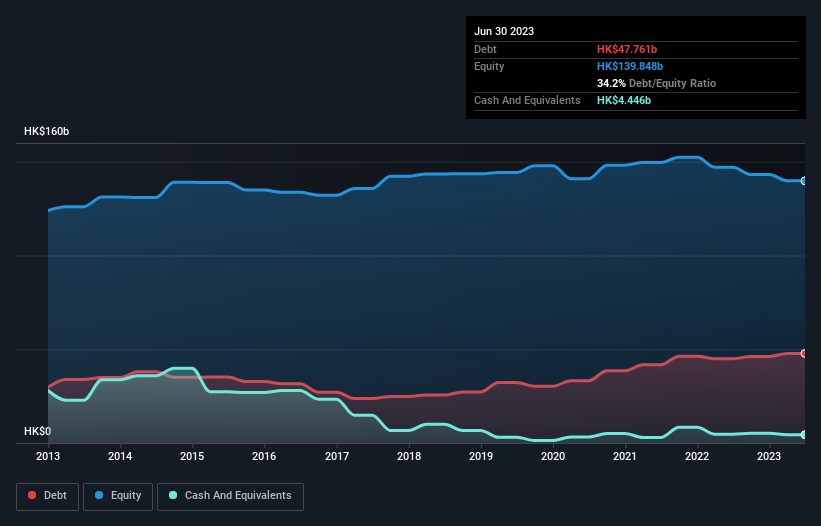- Hong Kong
- /
- Real Estate
- /
- SEHK:101
Here's Why Hang Lung Properties (HKG:101) Has A Meaningful Debt Burden

Some say volatility, rather than debt, is the best way to think about risk as an investor, but Warren Buffett famously said that 'Volatility is far from synonymous with risk.' So it might be obvious that you need to consider debt, when you think about how risky any given stock is, because too much debt can sink a company. Importantly, Hang Lung Properties Limited (HKG:101) does carry debt. But should shareholders be worried about its use of debt?
When Is Debt A Problem?
Debt assists a business until the business has trouble paying it off, either with new capital or with free cash flow. Part and parcel of capitalism is the process of 'creative destruction' where failed businesses are mercilessly liquidated by their bankers. However, a more usual (but still expensive) situation is where a company must dilute shareholders at a cheap share price simply to get debt under control. Of course, debt can be an important tool in businesses, particularly capital heavy businesses. When we examine debt levels, we first consider both cash and debt levels, together.
See our latest analysis for Hang Lung Properties
How Much Debt Does Hang Lung Properties Carry?
As you can see below, at the end of June 2023, Hang Lung Properties had HK$47.8b of debt, up from HK$44.9b a year ago. Click the image for more detail. However, it also had HK$4.45b in cash, and so its net debt is HK$43.3b.

How Strong Is Hang Lung Properties' Balance Sheet?
According to the last reported balance sheet, Hang Lung Properties had liabilities of HK$14.2b due within 12 months, and liabilities of HK$56.5b due beyond 12 months. Offsetting these obligations, it had cash of HK$4.45b as well as receivables valued at HK$3.44b due within 12 months. So its liabilities total HK$62.9b more than the combination of its cash and short-term receivables.
When you consider that this deficiency exceeds the company's HK$50.9b market capitalization, you might well be inclined to review the balance sheet intently. In the scenario where the company had to clean up its balance sheet quickly, it seems likely shareholders would suffer extensive dilution.
We use two main ratios to inform us about debt levels relative to earnings. The first is net debt divided by earnings before interest, tax, depreciation, and amortization (EBITDA), while the second is how many times its earnings before interest and tax (EBIT) covers its interest expense (or its interest cover, for short). Thus we consider debt relative to earnings both with and without depreciation and amortization expenses.
As it happens Hang Lung Properties has a fairly concerning net debt to EBITDA ratio of 6.3 but very strong interest coverage of 16.5. So either it has access to very cheap long term debt or that interest expense is going to grow! Notably Hang Lung Properties's EBIT was pretty flat over the last year. Ideally it can diminish its debt load by kick-starting earnings growth. There's no doubt that we learn most about debt from the balance sheet. But it is future earnings, more than anything, that will determine Hang Lung Properties's ability to maintain a healthy balance sheet going forward. So if you're focused on the future you can check out this free report showing analyst profit forecasts.
Finally, a business needs free cash flow to pay off debt; accounting profits just don't cut it. So the logical step is to look at the proportion of that EBIT that is matched by actual free cash flow. Over the most recent three years, Hang Lung Properties recorded free cash flow worth 54% of its EBIT, which is around normal, given free cash flow excludes interest and tax. This cold hard cash means it can reduce its debt when it wants to.
Our View
Mulling over Hang Lung Properties's attempt at managing its debt, based on its EBITDA,, we're certainly not enthusiastic. But on the bright side, its interest cover is a good sign, and makes us more optimistic. Once we consider all the factors above, together, it seems to us that Hang Lung Properties's debt is making it a bit risky. That's not necessarily a bad thing, but we'd generally feel more comfortable with less leverage. Given our hesitation about the stock, it would be good to know if Hang Lung Properties insiders have sold any shares recently. You click here to find out if insiders have sold recently.
When all is said and done, sometimes its easier to focus on companies that don't even need debt. Readers can access a list of growth stocks with zero net debt 100% free, right now.
Valuation is complex, but we're here to simplify it.
Discover if Hang Lung Properties might be undervalued or overvalued with our detailed analysis, featuring fair value estimates, potential risks, dividends, insider trades, and its financial condition.
Access Free AnalysisHave feedback on this article? Concerned about the content? Get in touch with us directly. Alternatively, email editorial-team (at) simplywallst.com.
This article by Simply Wall St is general in nature. We provide commentary based on historical data and analyst forecasts only using an unbiased methodology and our articles are not intended to be financial advice. It does not constitute a recommendation to buy or sell any stock, and does not take account of your objectives, or your financial situation. We aim to bring you long-term focused analysis driven by fundamental data. Note that our analysis may not factor in the latest price-sensitive company announcements or qualitative material. Simply Wall St has no position in any stocks mentioned.
About SEHK:101
Hang Lung Properties
An investment holding company, engages in the property investment, development, and management activities in Hong Kong and Mainland China.
Fair value with mediocre balance sheet.
Similar Companies
Market Insights
Community Narratives



